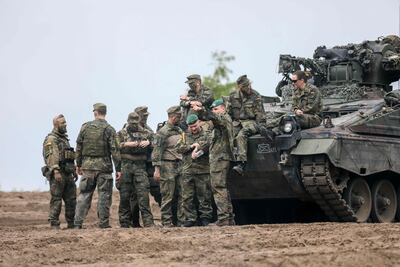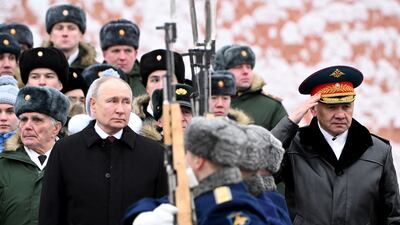Nato troops would prevail in a war with Russia if the Kremlin widened its offensive on eastern Europe, according to one of the alliance’s top generals.
Carsten Breuer, Germany’s highest-ranking soldier, said he had “no doubt” Nato forces positioned in the East would be able to defeat Moscow’s troops.
The bullish tone reflects two years of frantic rearmament by Germany and its Nato allies after Russia invaded Ukraine in February 2022.
Russian President Vladimir Putin struck a similarly optimistic note in a speech marking a patriotic national holiday on Friday, in which he hailed troops fighting in Ukraine as heroes.
Moscow’s nuclear deterrent has been “95 per cent” modernised and Russia’s war economy has “multiplied both weapons production and supplies to troops”, Mr Putin said.
The Russian offensive in Ukraine, ordered by Mr Putin two years ago on Saturday, has descended into a near-stalemate with no significant movement on the front line in recent months.
While there are signs the West’s stamina in backing Ukraine is flagging, senior Nato figures have repeatedly warned that allowing a Russian victory would embolden Mr Putin to attempt further land grabs.

The Baltic ex-Soviet states bordering Russia are the most exposed part of Nato’s front line and troops from the UK, Germany and allied militaries have been stationed on the eastern flank as a deterrent.
The rearming German military has “adapted our training to focus primarily on deployment and to operating on Nato’s eastern flank”, its defence chief Gen Breuer told The Daily Telegraph.
Germany is “on the right track” to be battle-ready within five years, he said, despite the huge costs of new equipment and public squeamishness about preparing for war.
Asked whether Nato could fight off a Russian invasion in the East, he said: “Yes, I have no doubt of that.”
Nato rearmament
Chancellor Olaf Scholz’s government approved €100 billion ($108.22 billion) of off-the-books spending to upgrade a German military widely seen as having fallen into disrepair since the end of the Cold War.
Across the alliance, 18 out of 31 Nato countries are expected to meet the key target this year of spending 2 per cent of their economic might on defence, up from only six in 2014.
However, German opposition leader Friedrich Merz claimed in a debate on Thursday that ministers had no plan to meet the 2 per cent target permanently once the €100 billion pot runs out.
“What weighs most heavily is that Ukraine is still not getting all the material it needs to effectively fight off Russia’s war of aggression,” said Mr Merz. He also called for Germany to donate Taurus cruise missiles to Kyiv.

The focus on upgrading Europe’s capabilities has been thrown into sharper relief by the return of Donald Trump and his threats to tear up Nato’s mutual defence guarantee if allies do not contribute more.
Russia’s arms production is also putting the West under pressure, giving Moscow an advantage in manpower and ammunition over Ukraine’s forces on the battlefield.
Mr Putin on Friday cast the Russian campaign as a “defence of its vital interests” in his speech on Defender of the Fatherland Day, in which he described troops as heroes fighting for “truth and justice”.
On Thursday he flew on a modernised Tu-160M nuclear-capable strategic bomber, boasting of Russia’s military capability despite the loss of thousands of battle tanks in Ukraine.
“Incorporating our real combat experience, we will continue to strengthen the armed forces in every possible way, including ongoing re-equipping and modernisation efforts," Mr Putin said in his Friday speech.
"Today, the share of modern weapons and equipment in the strategic nuclear forces has already reached 95 per cent, while the naval component of the 'nuclear triad' is at almost 100 per cent.”


